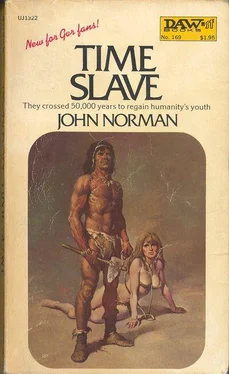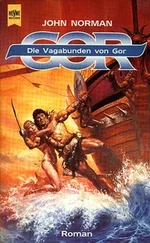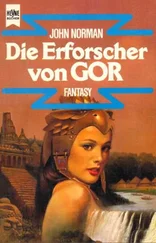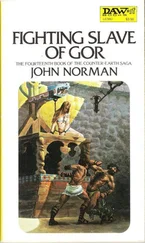“No,” said Gunther, “there would be only one truth.”
“But a thousand utilities?”
“Yes,” said Gunther.
“What then,” said Herjellsen, “of utility as a guide to truth?”
“It is still,” said William, “the best we have.”
“Yes,” said Herjellsen, “I think that is true.” He smiled at William. “Only I do not find your `science’ too useful. There are many things I find of interest which it does not explain.”
“You refer, perhaps,” said William, “to reputed psychic phenomena, extrasensory perception; psychokinesis, and such?”
Herjellsen shrugged, neither admitting anything nor disagreeing with William.
“Such phenomena do not exist,” said William.
“Perhaps not,” said Herjellsen, “but it is interesting to note that, even did they exist, science as it is presently constituted could not explain them.”
“So?” asked William.
“So we must be wary,” said Herjellsen, “that we do not take as our criterion for existence what science can explain. At one time science could not explain the functioning of a magnet, at another time the falling of a stone, the digestion of food, the circulation of the blood.”
“That is different,” said William.
“Surely it is an obvious fallacy to argue from the inexplicability of a phenomenon to its lack of existence.”
“Not always,” said William.
“Explain to me,” said Herjellsen, “the fact of consciousness, the fact that when I wish to move my hand, my hand moves.”
William said nothing.
“Of these things,” said Herjellsen, “I am more certain than I am of the existence of the world, and your science cannot explain them.”
“Do you demean science?” asked William.
“I only require it,” said Herjellsen, “to be adequate to the whole of experience.” Then he looked at William. “I am confident,” he said, “that whatever may be the nature of the reality it cannot be as our science maintains it to be.”
“Why not?” asked William.
“Because of the radical discontinuity of mind and matter,” said Herjellsen.
“I do not understand,” said William.
“I am confident,” said Herjellsen, “that the same power that causes water to flow moves in the dreams of a sleeping lion, that causes fire to burn and worlds to turn guides the equations of Descartes, the stick of Archimedes, drawing its circles in the sand, that causes a seed to germinate and a flower to open its petals to the sun moves in your mind and mine.”
“Perhaps,” said William.
“The reality and the power is one,” said Herjellsen.
“What do you propose to do about it?” asked William.
“The power is in me,” said Herjellsen, “as much as in any seed, in any leaf, in any tree, in any world.”
“But what are you going to do?” asked William.
“I am going to touch the reality,” said Herjellsen.
William was silent. Then he said, “And with what tool are you going to do this?”
“With the only tool I have,” said Herjellsen, “with that which is most akin to it, most unexpected, most alien to science’s accustomed modalities.”
“And what tool is that?” asked William, skeptically.
“My mind,” said Herjellsen. “My mind.”
Hamilton could not take her eyes from the cubicle.
It was some seven feet in height, and some seven feet in length and breadth.
The walls were of clear, heavy plastic. Access to the cubicle was by way of a small, sliding panel, some eighteen inches in width, some four feet in height. It was closed now.
It seemed very primitive, somehow. But Hamilton understood its primitiveness as one might have understood the primitiveness of the first steam engine. It was simple, and crude, and yet the wonder of it was what was herein, per hypothesis, harnessed. It would have been simpler, more reassuring, could one have seen a wheel turn, a valve lift and fall, but there was little to note within save an odd play of light, a photic anomaly, now at the fringes of the cubicle, now like beads of bright water at its edges, pulsating, corruscating, then in small threads darting across the heavy plastic to join other threads, other ripples of light across the cubicle. These beads, and leapings, and threads increased. But the light was not the phenomenon, but its accompaniment. It was no more than the footprint of a summoned force, an impression, not the force, marking its passage. It was a crushed leaf, a snapped branch in its path, that was all, not the beast, not the power, but the sign, the sign of the beast, the power, the force which Herjellsen called P.
P was present.
In the cubicle was P.
Hamilton was terrified. She was a little girl crying in the night.
“Do not be afraid,” said William. He was tense.
“It is tomorrow!” cried Hamilton suddenly.
“No,” said Gunther. “No. It is like the light. It will pass. It is a subsidiary effect, meaningless.”
Hamilton shuddered. William held her arm.
“It is tomorrow,” said Hamilton. “I know it is tomorrow.”
“It is a disordering of your sense,” said William. “Part of your mind senses the presence of P.”
“It is today, too,” wept Hamilton.
“Do not be frightened,” said William. “This is similar to a temporary drug-induced schizophrenia. It is irrelevant to the experiment, the substance of the work”
William’s eyes were closed. He smiled. “I now have the consciousness of an afternoon, when I was six, in London, on a holiday. It is real.”
“It is a memory,” whispered Hamilton.
“No,” said William. “It is not like a memory. It is real, and it is now.”
“It cannot exist at the same time as now,” whispered Hamilton. “This is a different time.”
“Two times exist now,” said William. “Each is real. Both are real.”
“No,” said Hamilton.
Hamilton shook her head. Herjellsen sat silent, his head beneath the steel hood, his heavy fists clenched. He was leaning forward, tense in the wooden chair. His shoulders were hunched. The toes of his heavy shoes pressed at the boards of the floor, the black, rubber heels lifted. His body, powerful, muscular, squat, seemed then like a rock, but a rock that might contain a bomb, a cart of granite that might explode. His large head was bent, his eyes closed. He was alone under the steel hood, with the coils and receptors, with the darkness, with the tension, the straining of that large, unusual, maddened brain.
Hamilton knew that the brain emitted waves. These could be empirically verified.
They were real.
“The reality and the power is one,” Herjellsen had claimed.
“Why then,” had asked William, “do you not think you might touch the reality with electricity, or magnetism, or even the blow of your fist?”
“They are crudely intraphenomenal,” had said Herjellsen. “They are relative to the perceptual mode.”
“I do not understand,” had said William.
“They are the furniture of the room,” had said Herjellsen. “They are not the key to the door.”
But the waves of the brain were crudely physical.
But, Hamilton recalled, Herjellsen had cried out that the simplistic dichotomy between the physical and the mental was an intellectual convenience, not corresponding to what must be the case. “The dichotomy is false,” had said Herjellsen. “If it were true, the mind could not move the body or the body affect the mind. If it were true, then I could not move my hand when I wish. If it were true, I could not feel pain when my body was injured.”
“What then is true?” had asked William.
“A more useful distinction, though itself ultimately dubious,” had said Herjellsen, “is that between the phenomenal and the nonphenomenal, that between the categories and sensibilities of experience and that which exceeds such categories and sensibilities, that which is other than they.”
Читать дальше












